Best Remote Control Golf Trolleys 2025
A look at the most cutting-edge electric trolleys around that can be controlled at your fingertips
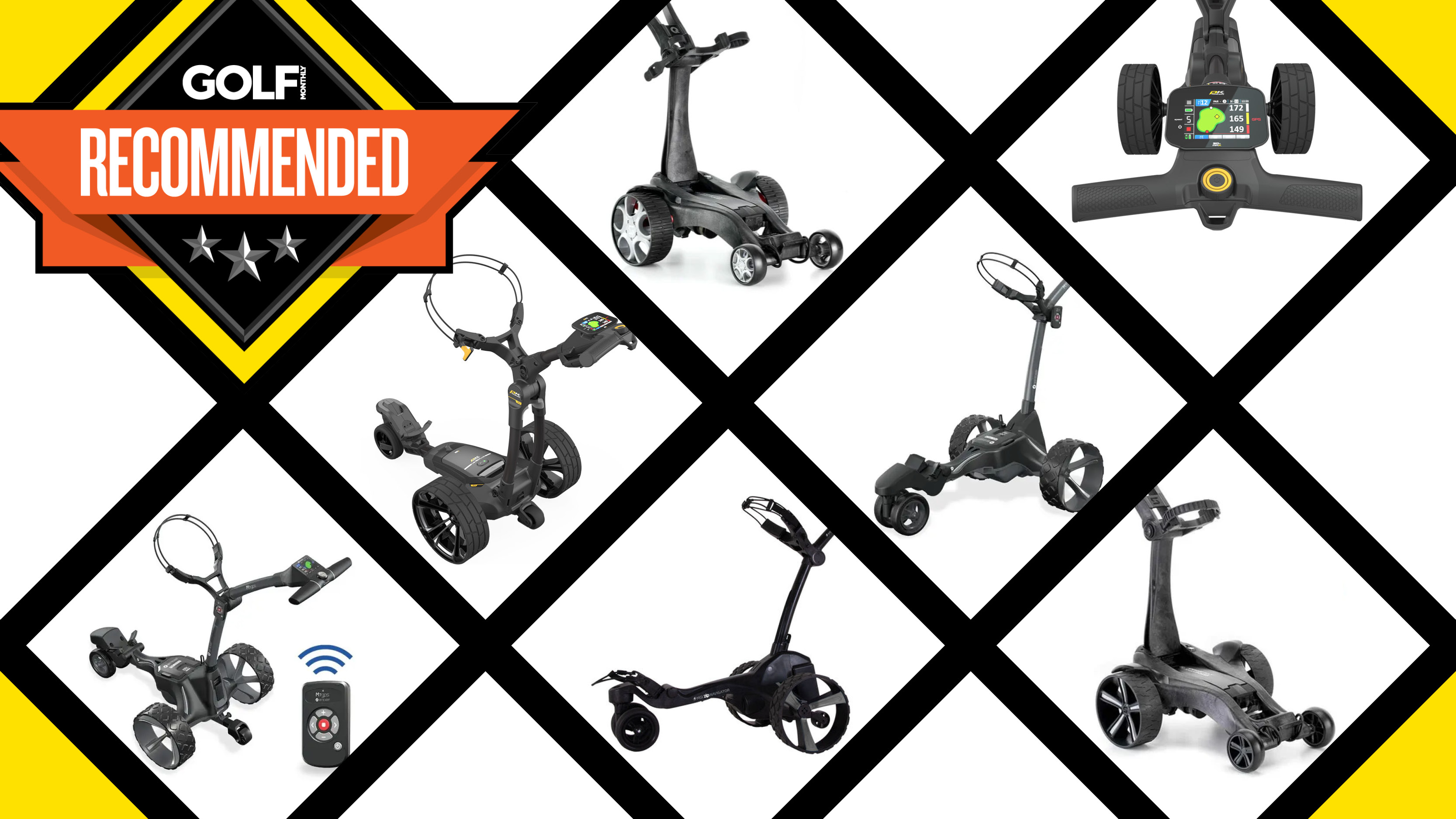

Sam Tremlett
Golf can be hard enough at times, so any help is usually welcome. The best golf carts do just that. They allow us the enjoyment of walking the course without having to carry our bags, saving energy and hopefully a few shots along the way.
Electric golf trolleys are a tech-friendly alternative to the best golf push carts, with some models featuring remote control functionality. Armed with a pocket-sized handset you can control the speed and direction of the trolley without ever having to guide it by hand - there are even some models that will follow you as you walk the fairways. Unsurprisingly these models are more expensive but they do offer you a greater degree of freedom - a hands-free experience can be a real game changer for some golfers.
In this guide we’ve selected some of the best electric golf trolleys on the market, chosen from the many models we’ve tested. By presenting a number of options, all with full reviews, we’ll hopefully aid you in your hunt for the best remote control golf trolley for you. Alternatively, after reading this guide you may decide that ‘going remote’ isn’t for you after all. If that’s the case we also have an extensive guide to best golf push trolleys, which still deliver the many advantages of not having to carry a bag while walking a course but without the added expense of their electric counterparts.
The Quick List
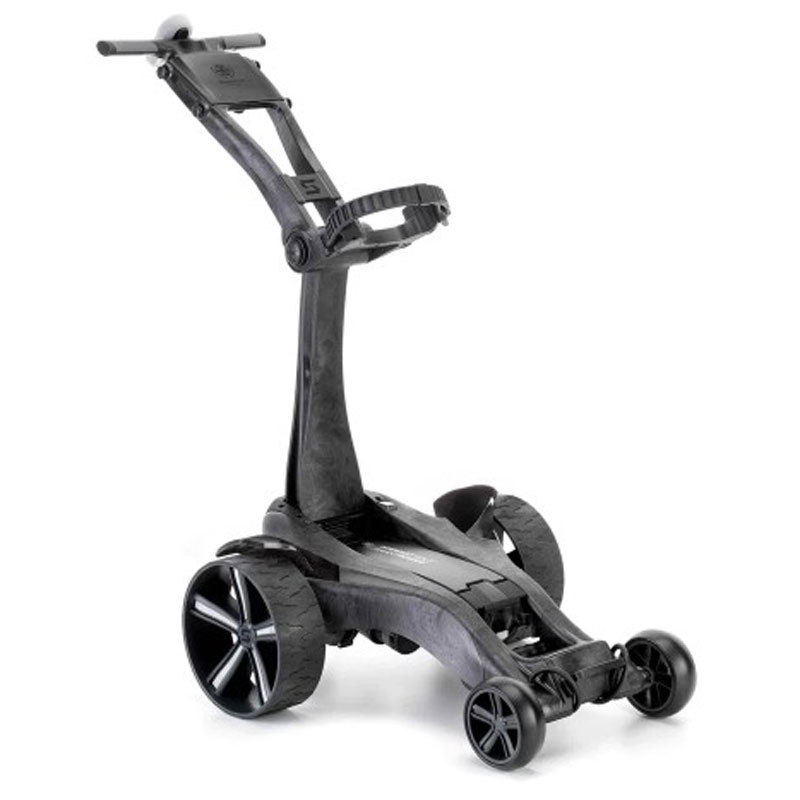
The Vertx Remote features the familiar Stewart Golf design, but it's the new technology that makes up the trolley's DNA that creates a class-leading remote control experience.
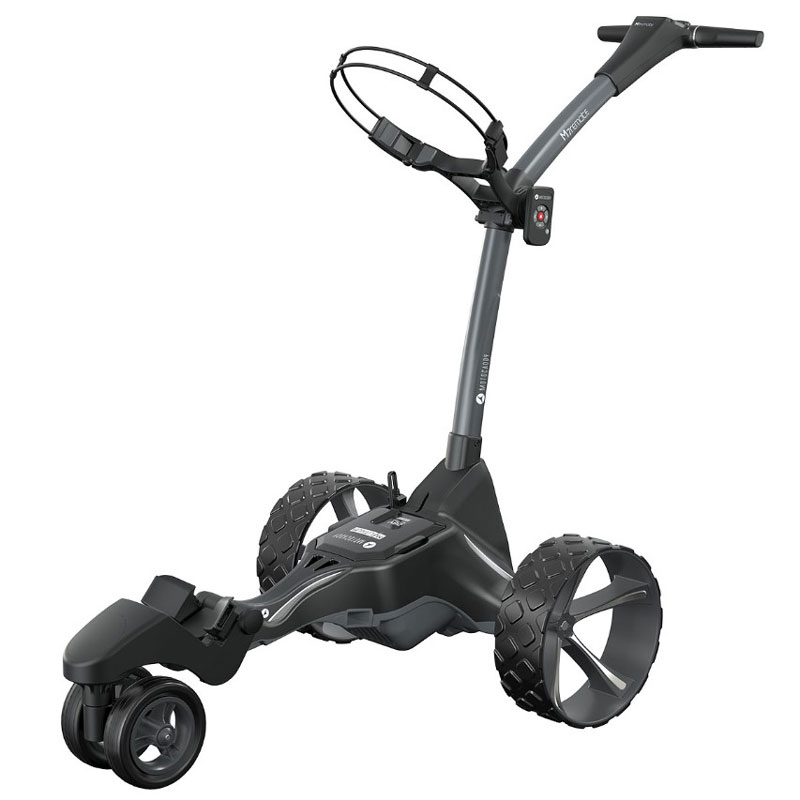
A comprehensive and enjoyable remote-controlled golf trolley. The remote-control functionality works as well as ever and the Performance Plan makes for a superb GPS experience.
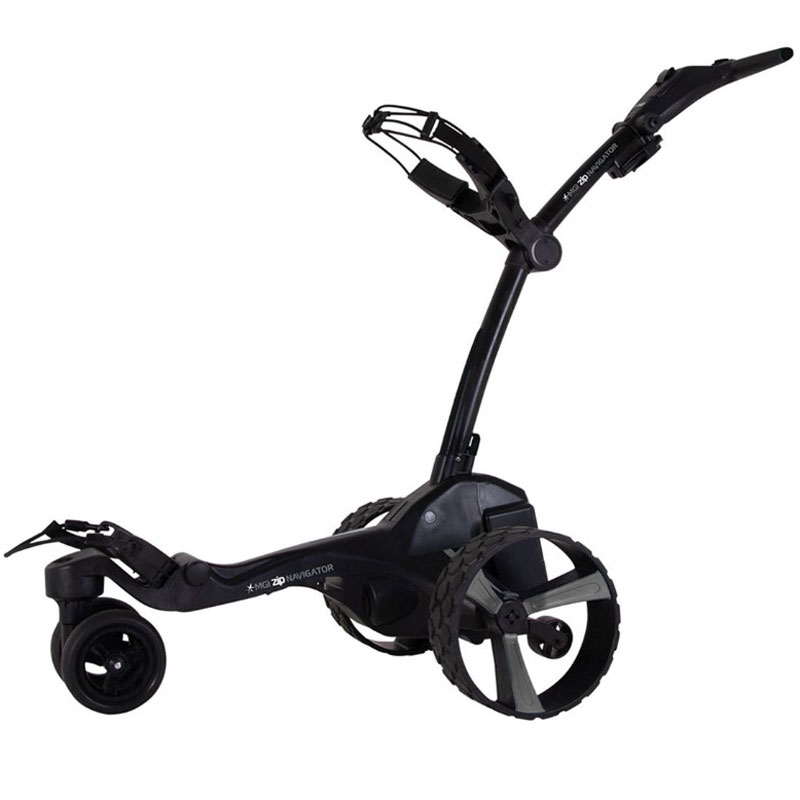
The MGI ZIP Navigator is a well-rounded remote electric trolley. It is well-built, responsive and stable, with the main standout being how compact it is when folded.
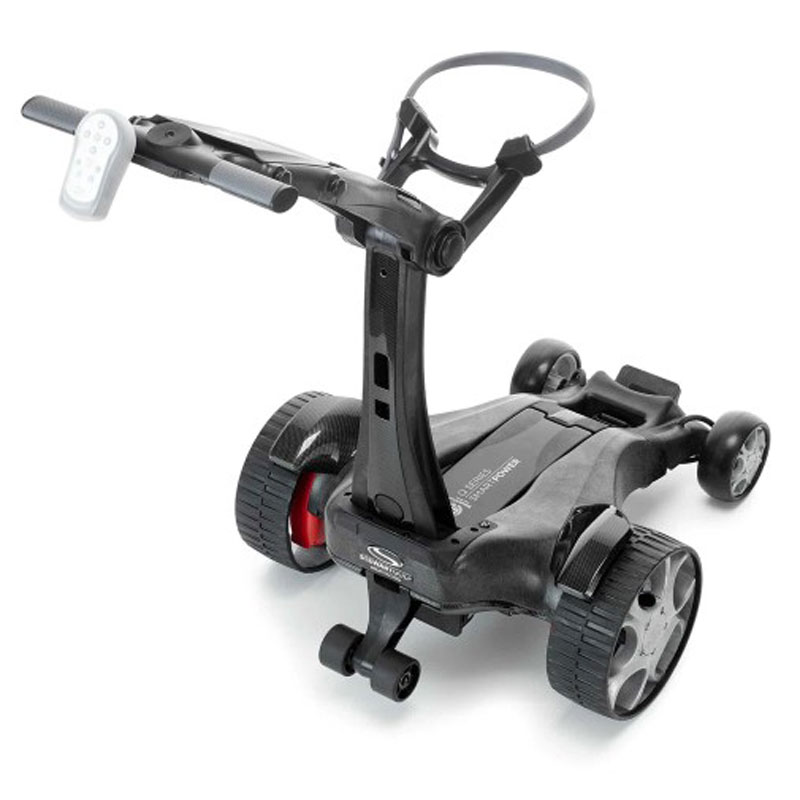
The Q Follow is great fun to use and, with practice, the switching between modes and use of the handset becomes second nature when out on the golf course.
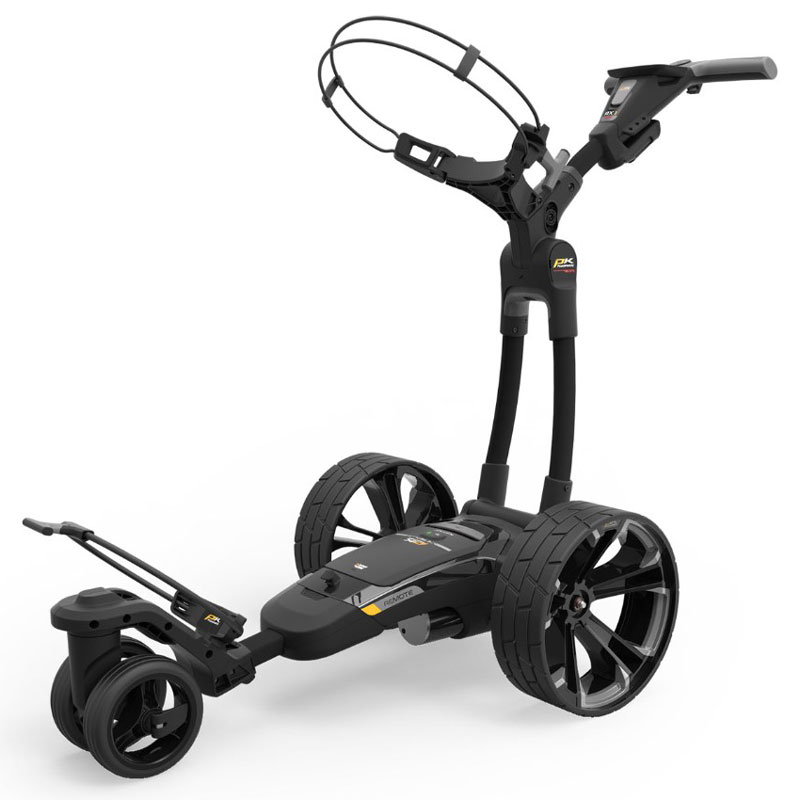
The RX1 GPS utilizes a class-leading battery, responsive remote functionality, a premium touchscreen and sports car looks to offer a comprehensive package.
Best Remote Control Golf Trolleys
Best overall
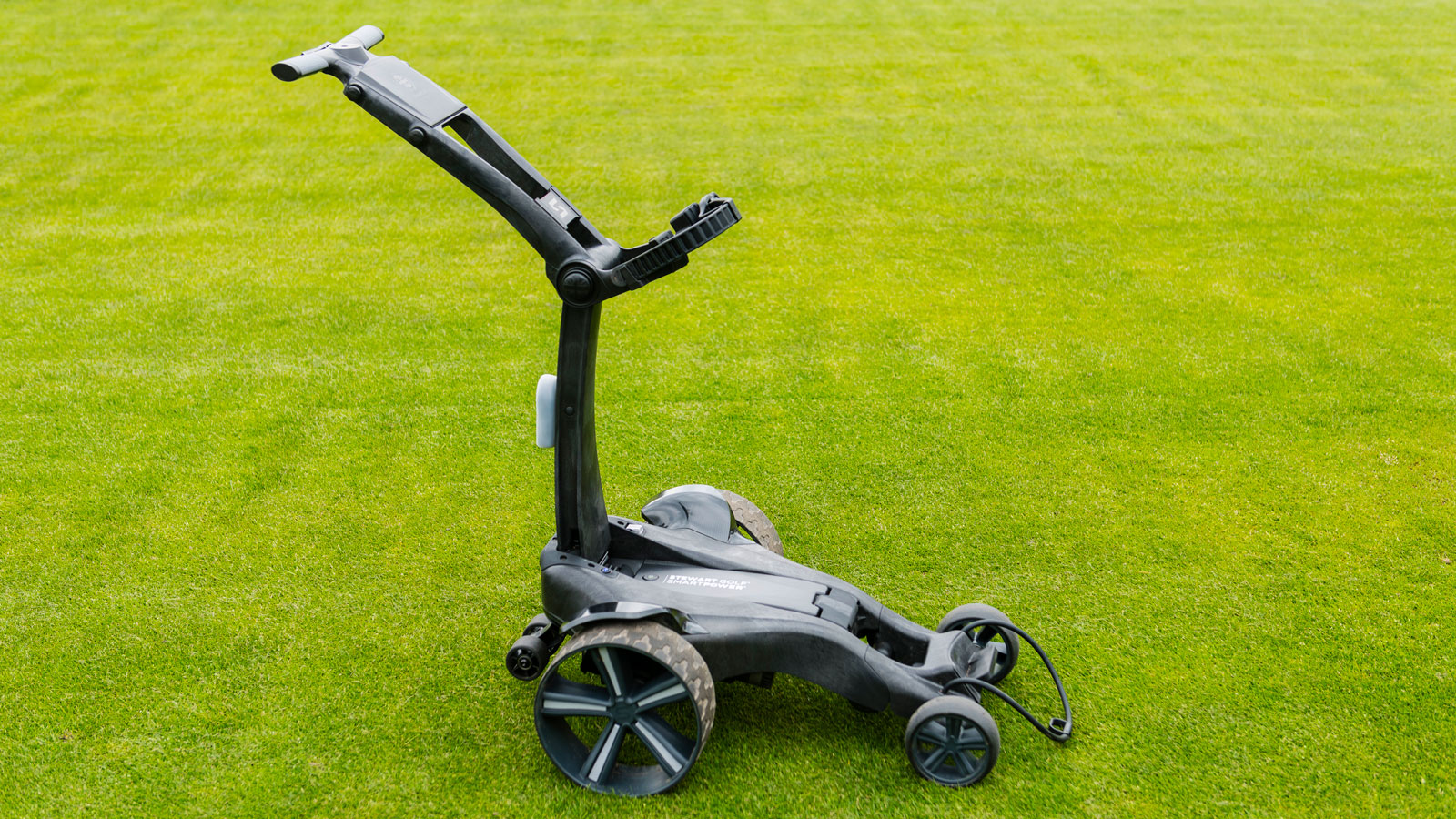
Specifications
Reasons to buy
Reasons to avoid
Stewart trolleys will be a familiar design to many and its Vertx Remote cart offers many of the design features that make them such a popular choice. Here you get its signature two-way folding system that’s easy to use and results in a relatively compact unit given it is a pretty chunky cart when compared to some of its rivals. Stewart has recognized this by incorporating a built-in carry handle. We loved how simple but effective this feature is, helping to negate some of the cart’s weight.
There’s some new technology here as well in the shape of the Active Terrain Control (ACT) operating system. During testing it allowed the trolley to navigate some challenging terrain with aplomb. It seemed that no slope was too much, leaving us seriously impressed with the ACT system. We particularly liked how it allows the cart to automatically travel at the same speed regardless of the terrain, without us having to change the power output. It meant a far more relaxing walk, knowing that we didn’t have to think about adjusting the speed whenever we hit a gradient. In short, it’s a class leader for remote functionality.
Of course any trolley, remote or otherwise, needs to be stable yet with the ability to maneuver around a course with ease. The Vertx, like all Stewart trolleys to date, uses two non-rotating front wheels. We found that it resulted in bags of stability, thanks to a nice, wide base. But it’s perfectly maneuverable as well. There are few downsides to the Vertx Remote other than its bulky dimensions but, unlike most of its rivals, it doesn’t have an embedded GPS in the handle. If this isn’t a dealbreaker it’s a cart that’s certainly worthy of your consideration.
- Read our full Stewart Golf Vertx Remote Trolley Review
Best screen
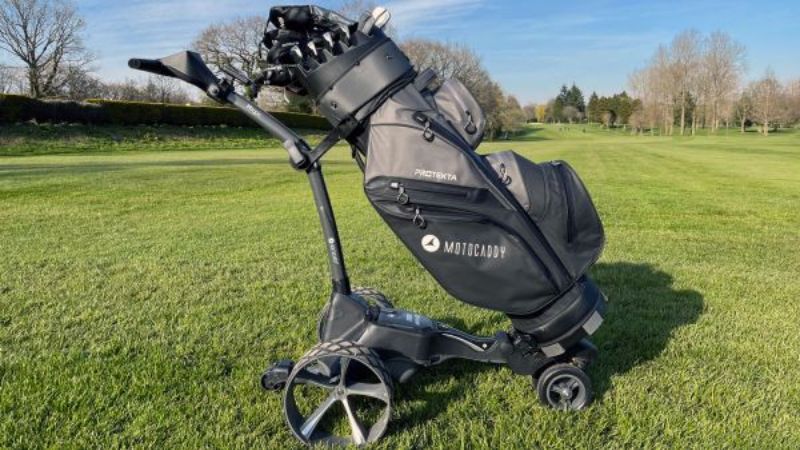
Specifications
Reasons to buy
Reasons to avoid
We liked the original Motocaddy M7 Remote Electric Trolley, but this updated model adds a few improvements to the design. The obvious upgrade is the inclusion of GPS. It’s partnered with a 3.5” touchscreen that’s built in the cart’s handle. From here you can receive yardages to the front, middle and back of each green as well as use a drag-and-drop function to place a pin wherever you want to receive a yardage. Screen quality is high and we found it easy to use even in the rain.
The M7 GPS’s remote system was equally as flawless. Using the compact remote, the cart was impressively responsive to both the speed and distance we needed it to move in. There’s a Down Hill control in play too that means it operates at a sensible speed when going downhill. The result is plenty of confidence that the cart will be there waiting for you beside your ball.
The functionality is aided by a practical design that allows the wheels to fold under the chassis. It makes for a compact package that we found fitted in our car nicely and was equally easy to store at home. In fact, despite it being an electric model, it’s comparable in size to some of the most compact trolleys on the market.
- Read our full Motocaddy M7 GPS Electric Trolley Review
Best value
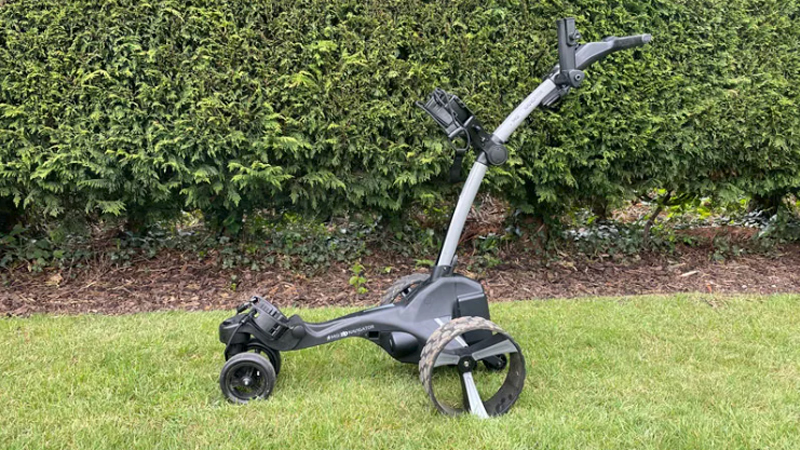
Specifications
Reasons to buy
Reasons to avoid
Australian brand MGI is a well-known player in the electric trolley market and its Zip Navigator model is a welcome addition. The fact that it’s offered at a competitive price might be the headliner here but it’s the many features that made it so enjoyable to use out on the course. The first thing we noticed during testing was just how stable the trolley is. This is in large part to a design that includes a fourth wheel. Located at the rear of the trolley it stops it from tipping backwards when you find yourself on a steep incline.
The stability was partnered by a responsive remote system that we found to be really effective. We especially liked the downhill speed control feature, which resulted in the confidence that wherever we found ourselves on the course, the Zip Navigator would be there waiting for us. The remote also has a handy lock button that means when it’s stored in your pocket it won’t allow you to press any buttons in error. Alternatively, the cart can be controlled from the T-Bar, although we didn’t really get on with this.
While the trolley is among the heavier in this category - it weighs around 16kg/35lbs - it does feature a neat design that allows you to invert the wheels before folding it down. It’s a fuss-free system that makes for a relatively compact package, fitting comfortably into the trunk, or boot, of our car.
- Read our full MGI Zip Navigator Remote Electric Trolley Review
Easy to use
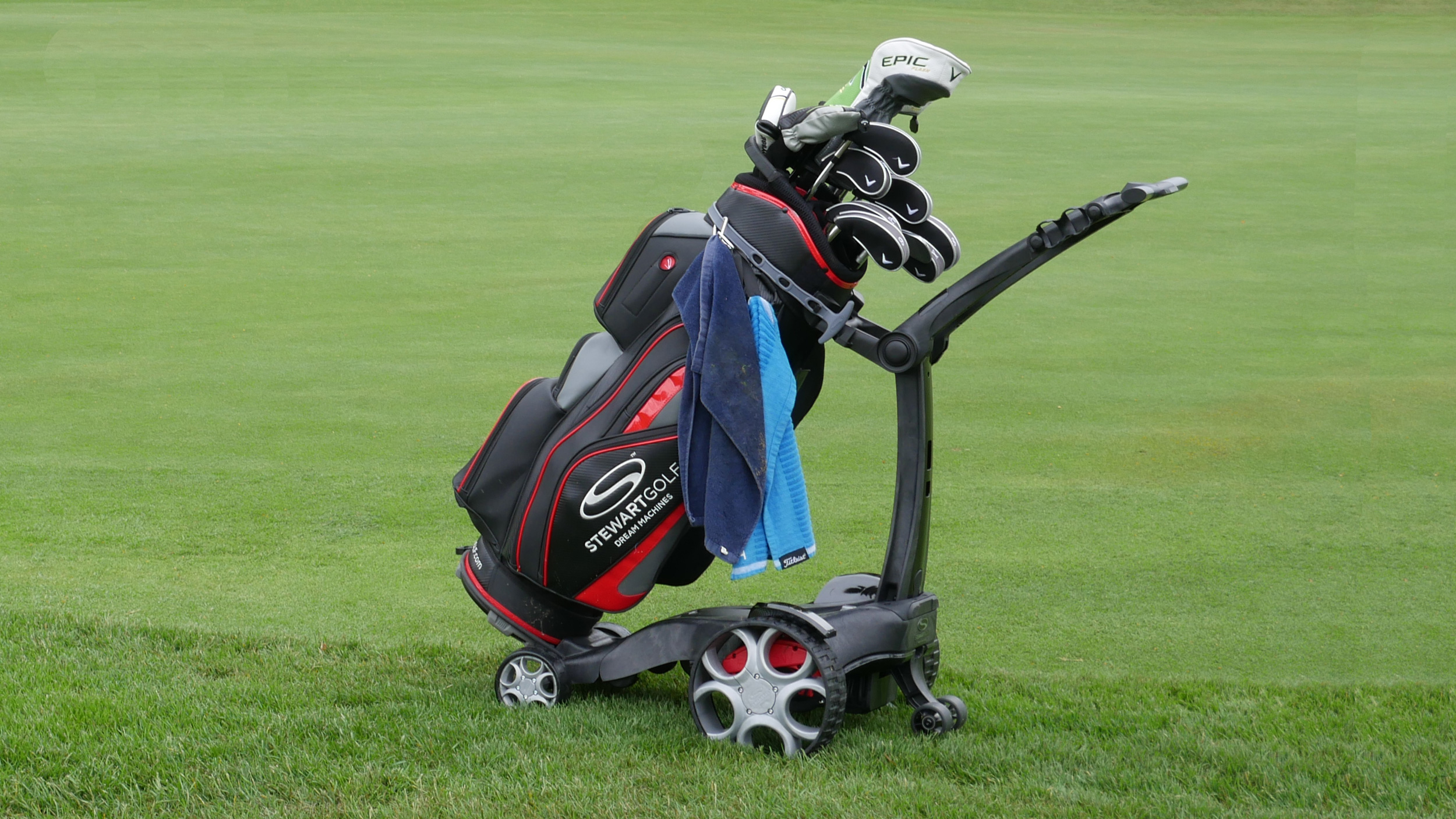
Specifications
Reasons to buy
Reasons to avoid
What makes a remote control golf trolley easy to use? First there’s the ability to fold it up and down without issue. Then there’s the performance out on the course. In both areas, the Q Follow excels.
We found that the new frame design resulted in a really compact trolley when folded down. Getting there was a breeze too. Folding it down requires just two buttons and the battery and handset remained securely in place during the process. We also appreciated that it can be stored vertically, which helps if saving space is an issue.
Out on the course, the Q Follow was just as straightforward to use. The Bluetooth handset makes for a genuinely pleasurable hands-free experience, with the trolley following you around at a sensible distance. However, if required, you can switch from Follow mode to Remote, allowing you to take more control when needed. We found this handy when sending the trolley ahead of us to the next tee.
Stability was equally impressive. The wide front wheel base translates to a design that seems to almost hug the ground. We never had any concern that it would tip over despite its weight. All-in-all it makes for an innovative trolley that’s enjoyable to use..
- Read our full Stewart Golf Q Follow Electric Trolley Review
Most compact
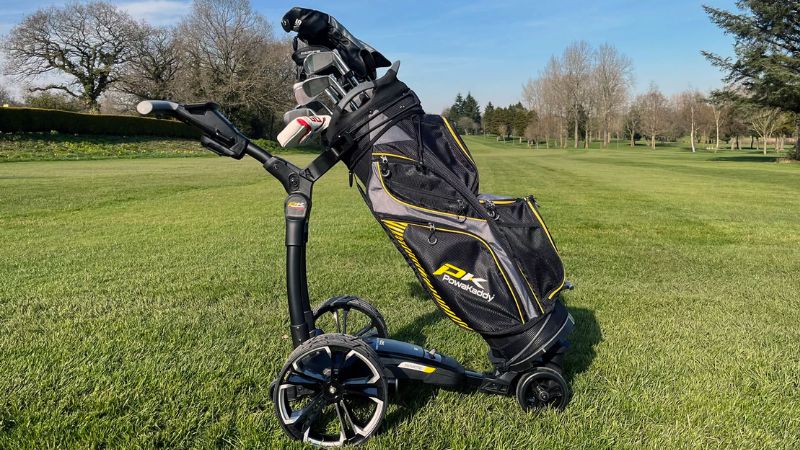
Specifications
Reasons to buy
Reasons to avoid
If aesthetics matter to you then the PowaKaddy RX1 trolley should appeal with its matte black finish and yellow detailing that result in a premium looking trolley. But this cool customer impressed us more with its functionality. Firstly, it’s nice and compact when folded. If you’re after an electric trolley but are worried that they tend to be pretty bulky then the RX1 should help elevate some of those concerns. It folds down using a simple single step process that results in a longer yet slimmer shape than most of its rivals.
The RX1’s remote function is driven by a class-leading battery that’s both slim and light. This is mirrored in the control that’s well-designed and fitted nicely in our hands during testing. Of course it needs to work well, too. And it does.
We found it easy to use, allowing us to direct the cart around the course comfortably. It handled gradients and uneven ground without issue, helped in no small part by its clever Slope Traverse Assist technology. This enables the trolley to maintain a straight line even when the going gets tough. Coupled with the swiveling front wheel and the self-sensing braking system and you have a cart that was stable and reliable at all times.
As its name suggests, the RX1 has a built-in GPS system that uses a 3.5” full-color touchscreen to allow you to see yardages to the front, middle and back of the green, as well as any hazard. It uses Drop Flag technology to allow you to find the exact pin distance too. On top of this you can also view the stroke index of the hole you’re on and keep score via a digital scorecard.
- Read our full PowaKaddy RX1 GPS Electric Trolley Review
How We Test
As with all the products we review, we test golf trolleys in a comprehensive fashion. To gain a thorough understanding of their capabilities we take them out on to the course. Here we assess their performance for ease of use, maneuverability, stability and more. We also take in a range of conditions so we can appreciate how a trolley fairs during different seasons.
Again, as with all reviews, the opinions you read here are formed through rigorous testing and thoughtful evaluation only - a good review can never be bought at Golf Monthly.
How to choose a new golf cart
The trolley market is a pretty crowded place. It can make choosing the right cart for you tricky. Hopefully the above reviews have been a great help but here are a few considerations to think about before you buy.
Push or electric cart?
The choice here may be governed slowly by budget - push carts are simply less expensive than their electric counterparts. Similarly if you need your trolley to be compact and easy to store - maybe the trunk of your car is small or your garage has limited space - then push trolleys are typically lighter and smaller when folded down. If your home course is pretty flat then a push cart also might be all that you require.
In contrast, electric, remote and follow models are larger and more expensive due to the in-built technology. That said they’re a great fit for courses that present a challenging walk. Remote models, as reviewed in this guide, allow for wireless control and can make a round more enjoyable. Follow models help deliver a hands-free experience, which can help save energy over the course of a round.
Weight
Naturally the remote electric technology means that these trolleys are heavier than a traditional push cart. But even so, you’ll need to be able to comfortably get the trolley in and out of your car. Look for models that have carry handles as well as considering the overall weight of the trolley.
Folding
Without electrics and batteries, push carts can fold down into impressively small sizes. If space at home, or in the car, is limited then you might be best to consider a push trolley. That said, if you’re sold on a remote control model then there are some designs that result in a more compact product when folded. Taking a look at a number of models to see how they compare when folded is the best way to assess the right model for you.
Maneuverability
All golf trolleys need to be able to move well and this is especially important for remote models, with stability being vital as well. In our testing we have found three-wheel models to offer both of these factors, however there are some good four-wheeled models too, such as the Stewart Golf trolleys we mentioned above.
Budget
By their very nature the best remote control golf trolleys are more expensive than push models. But within this category prices vary, too. We’ve highlighted a ‘best value’ model in this guide and it’s certainly worth doing your research to find the best model and the right price.
FAQs
How much does a remote control golf cart cost?
A remote model is certainly more expensive than a non-remote. The cheapest remote model start at around $800 and will go up to around $2500.
We hope you enjoyed this guide on best remote golf trolleys. For more trolley buying advice, be sure to have a read of the best value golf push carts, or best affordable golf carts guides.
Get the Golf Monthly Newsletter
Subscribe to the Golf Monthly newsletter to stay up to date with all the latest tour news, equipment news, reviews, head-to-heads and buyer’s guides from our team of experienced experts.

Dan has been with Golf Monthly team since 2021. He graduated with a Masters degree in International Journalism from the University of Sussex and looks after equipment reviews and buying guides, specializing in golf shoe, golf bag, golf cart and apparel reviews. Dan has now tested and reviewed over 30 pairs of golf shoes and is an expert in the field. A left-handed golfer, his handicap index is currently 6.5 and he plays at Fulford Heath Golf Club in the West Midlands.
Dan's current clubs:
Driver: Ping G440 Max 9°
Fairway: Ping G440 Max 15°, Ping G425 Max 20.5°
Irons: Cobra King Tec Utility, Ping i230 (5-PW)
Wedges: Ping Glide Forged Pro
Putter: TaylorMade Spider Tour X
Ball: Titleist Pro V1
- Sam TremlettSenior E-commerce Editor
-
 The Masters Final Round: TV Coverage, Live Streams, Start Times As Rory McIlroy Battles Bryson DeChambeau And History
The Masters Final Round: TV Coverage, Live Streams, Start Times As Rory McIlroy Battles Bryson DeChambeau And HistoryAll the info on live streams, TV broadcasts, and free coverage of one of the most hotly anticipated final days of any Major as McIlroy battles with DeChambeau
By Patrick Fletcher Published
-
 'I'm Not Going To Stand Here And Talk About Rory For 10 Minutes' - Shane Lowry Frustrated After Late Slip
'I'm Not Going To Stand Here And Talk About Rory For 10 Minutes' - Shane Lowry Frustrated After Late SlipThe Irishman spoke to the media after his round, but he was in no mood to discuss about McIlroy
By Michael Weston Published